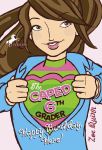Anachronisms and Authorial Bleed Through
 There are two kinds of anachronisms--things out of time--that writers have to watch out for. The more common pops up when we write about the past without sufficient care or research, and include a detail that doesn't belong in that period.
There are two kinds of anachronisms--things out of time--that writers have to watch out for. The more common pops up when we write about the past without sufficient care or research, and include a detail that doesn't belong in that period.
One example that struck me while reading Happy Birthday, Hero!, the first volume in the Caped 6th Grader series. On her twelfth birthday, young protagonist Zoe Richards starts to manifest superpowers. Her kindly grandfather, who was also a superhero before going into the dry-cleaning business, loans her the training manual he received two generations ago when he was twelve. That book tells Zoe that, until she passes her superhero tests, she should "dial 911 immediately" when she sees an emergency rather than trying to fix the problem.
According to a history of the 911 system, however, the very first 911 call was placed on 16 Feb 1968, in Haleyville, Alabama. It took several more years before 911 was a nationwide emergency number.
Grandpa is probably fifty years older than Zoe, so his training manual shouldn't mention calling 911. This common type of anachronism projects a contemporary detail back into the past, where it doesn't belong.
The opposite problem is moving a detail from the past forward to our time where it equally doesn't belong. I suspect this is a particular danger for people who write for kids because we draw ideas from our own childhoods.
An example of this from Happy Birthday, Hero! appears on page 3, when Zoe says that she admires a comics superheroine because she doesn't use "aerosol hair spray--bad for the ozone."
This EPA factsheet reminds us: Consumer aerosol products in the US have not used ozone-depleting substances (ODS) since the late 1970s because of voluntary switching followed by federal regulation. The Clean Air Act and EPA regulations further restricted the use of ODS for non-consumer products. All consumer products, and most other aerosol products, now use propellants that do not deplete the ozone layer, such as hydrocarbons and compressed gases.
The choice of whether to use certain aerosol hair sprays so as to help preserve the upper atmosphere was significant for girls in the late 1970s--when, I presume, author Zoe Quinn was growing up. (I also presume that name is a pseudonym.) But fictional Zoe Richards and her readers have never had to confront the moral dilemma of hair sprays.
When we write about kids, especially if we don't live with kids of the right age, I think we have a tendency to project our own childhoods into our stories. This is a form of what author Janni Lee Simner recently called "Authorial bleed through". The result is a detail that may seem very significant and resonant to us, but mean next to nothing to our target readers.


No comments:
Post a Comment